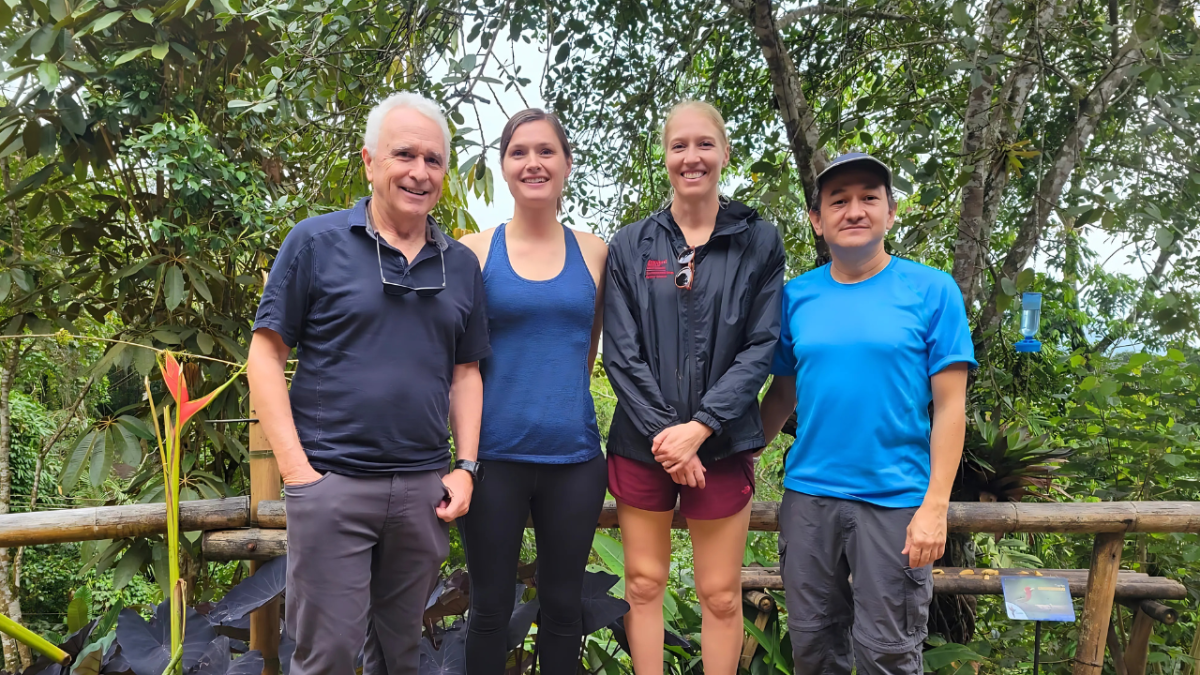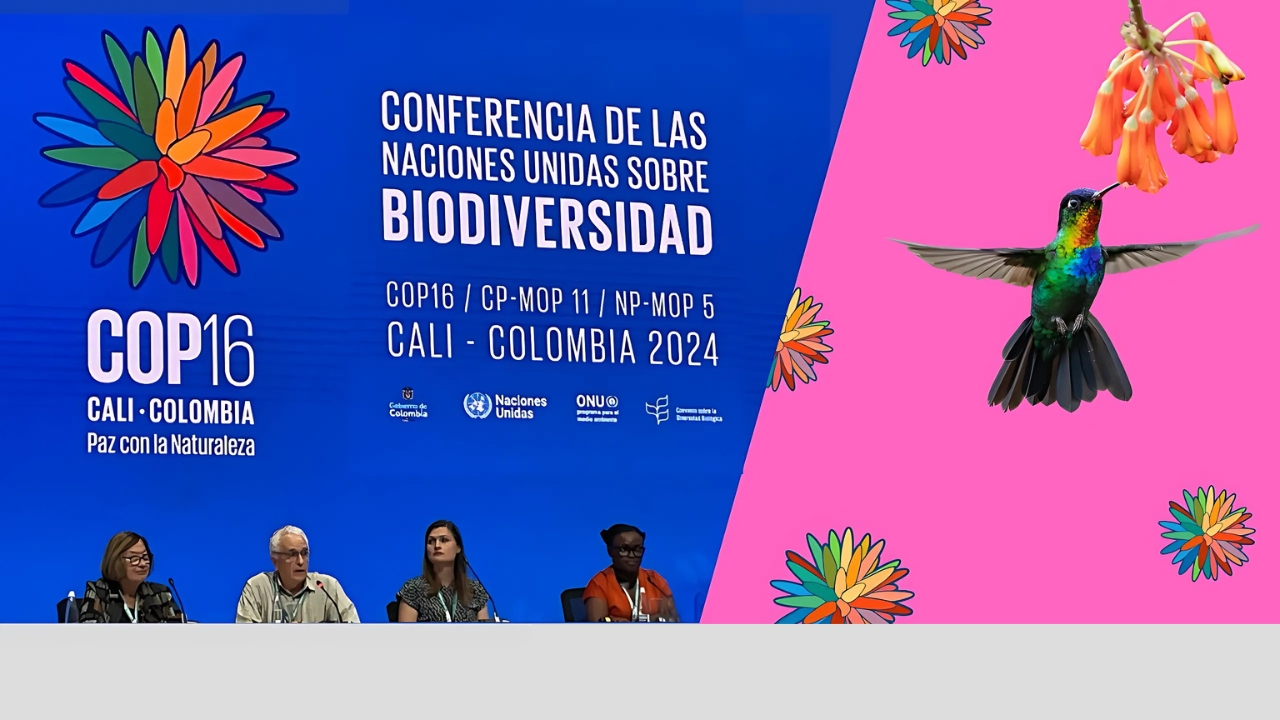
UCLA at COP16: Progress, setbacks and the race to save the planet
UCLA researchers played a pivotal role at COP16 in Cali, Colombia, sharing innovative conservation strategies to tackle global biodiversity loss.
In the bustling Colombian city of Cali, the 16th Conference of the Parties (COP16) to the Convention on Biological Diversity unfolded as a critical moment for the future of the planet.
From October 21 to November 1, representatives, scientists and activists from nearly 200 nations convened to address the urgent threat of biodiversity loss. Among the attendees were researchers from UCLA’s Center for Tropical Research and the Congo Basin Institute, who brought their expertise to the global stage. Their insights helped shape the critical discussions and decisions made at this pivotal summit.

Challenges, progress and U.S. absence
The COP16 agenda was daunting: assess progress on the Global Biodiversity Framework. Adopted in 2022 at COP15, the framework has ambitious targets, such as aiming to conserve 30% of the planet’s land and oceans by 2030.
“One of the main goals of this meeting was to see where all the countries who have signed these biodiversity agreements stand based on the goals set two years ago,” said Felipe Zapata, co-director of UCLA’s Center for Tropical Research who participated in the summit. “Some goals are aspirational, requiring immense funding and effort, and many have not been achieved.”
While delegates at COP16 grappled with the challenges of funding and implementing the Global Biodiversity Framework, progress was hampered by inconsistent national contributions and unclear execution strategies. By the conference’s close, fewer than a quarter of participating nations had submitted updated National Biodiversity Strategies and Action Plans—policy documents essential for outlining how each country will meet the framework’s targets. This shortfall left many attendees disappointed, according to Zapata.
At the same time, the conference made a historic move toward inclusivity and environmental justice. Parties reached the first-ever agreement to establish a permanent body of representation for local, Indigenous and Afro-descendant communities to influence decisions made at COP meetings—a development that many hailed as an essential step toward equitable conservation solutions.
Notably absent from the official proceedings was the United States. Despite being a leader in environmental issues, the U.S. is the only nation besides the Vatican that hasn’t joined the Convention on Biological Diversity. “It’s been 20 or more years since the United States has had an official delegate at these meetings, which is surprising,” Zapata said.
While the U.S. shares some of the convention’s goals and participates in its meetings, its absence as a full member limits its influence and hinders collective action. Political divisions and concerns about sovereignty have prevented America from ratifying the treaty, leaving the country on the sidelines of international efforts to conserve nature.
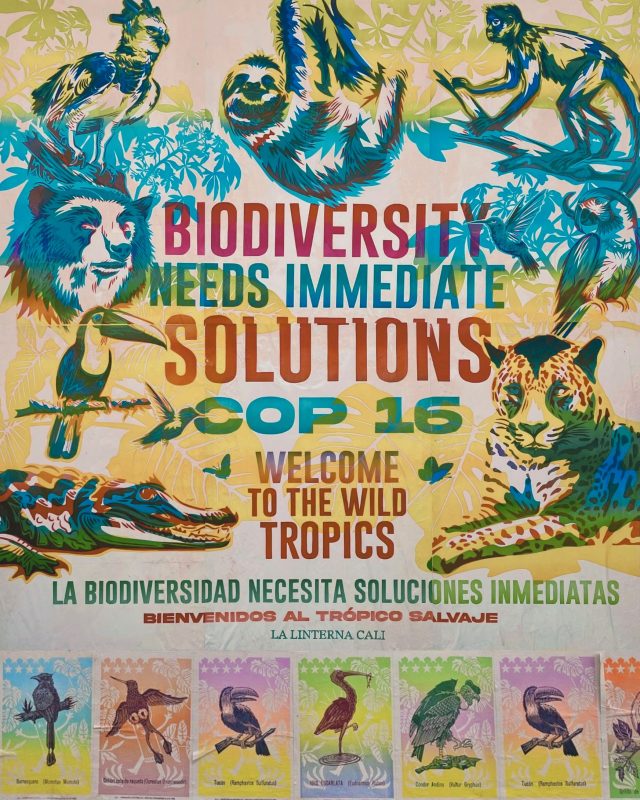
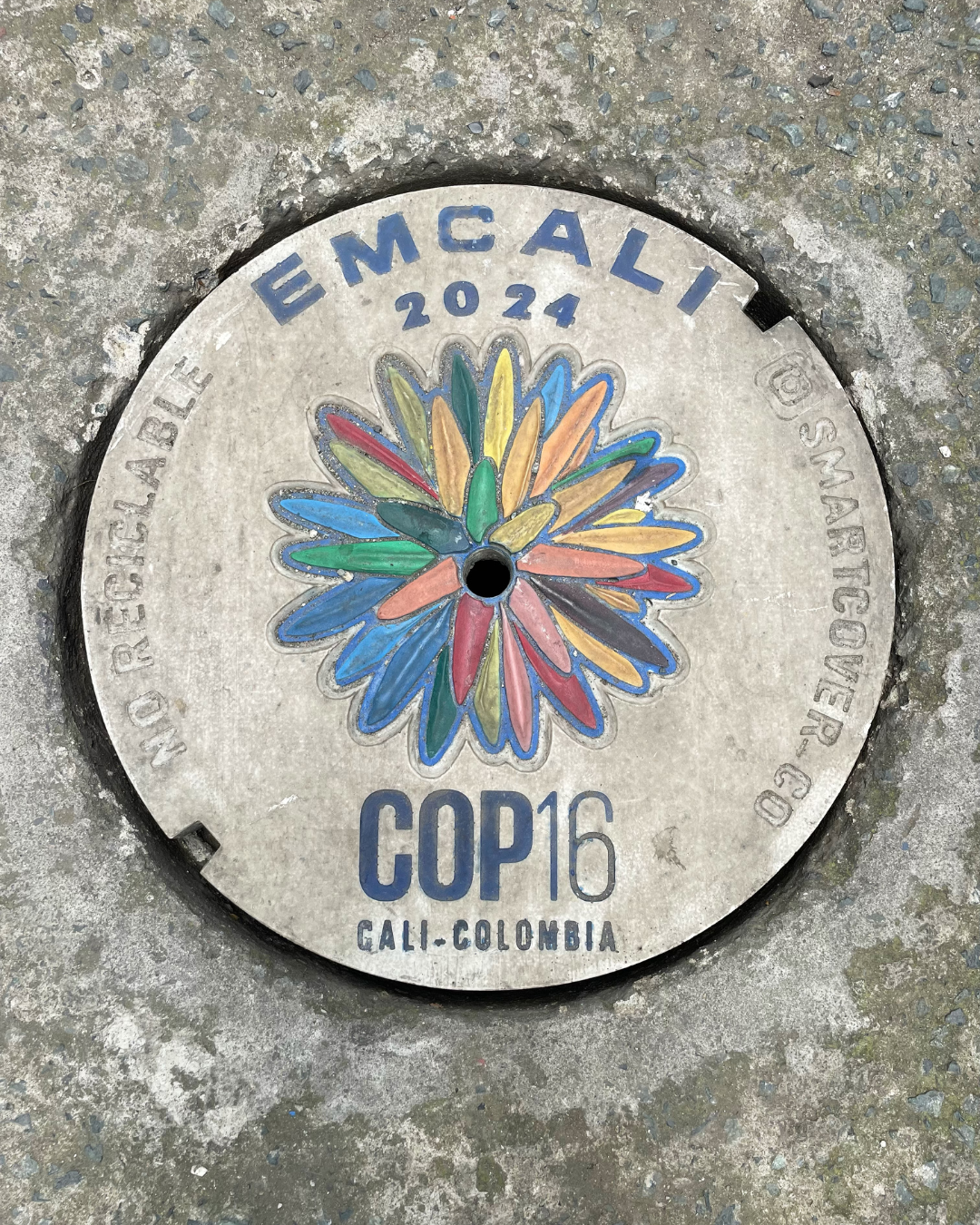

A seat at the table: UCLA’s contributions
UCLA researchers participated in several discussions that showcased their work and advanced global conservation dialogues.
Felipe Zapata: The Power of the Scientific Diaspora
Zapata highlighted the contributions of Colombia’s scientific diaspora. “Even though many of us work abroad, we actively contribute to biodiversity conservation in our home country,” he explained. Zapata urged a rethinking of “brain drain” narratives, advocating for greater recognition of diaspora scientists as bridges between local and global conservation efforts.
Tom Smith and Virginia Zaunbrecher: Community Conservation
Smith and Zaunbrecher showcased the co-managed biological field stations developed by the Congo Basin Institute—research facilities collaboratively run with local communities in Cameroon. These stations serve as vital hubs for biodiversity monitoring, scientific research and community-driven conservation efforts, ensuring that local expertise and sustainable practices guide decision-making.
Zaunbrecher also explored sustainable cocoa production in the Democratic Republic of Congo. Her presentation shed light on ongoing research as a model for balancing agriculture with biodiversity preservation.
Elsa Ordway: NASA’s PANGEA Initiative
Ordway presented on the NASA-funded PANGEA initiative, which integrates research across spatial scales—from remote sensing data to ground-level measurements—to analyze how tropical forests respond to climate change. Her work highlighted the importance of cutting-edge technology and collaboration with local partners across the tropics in shaping global conservation policies.
Nurit Katz: Universities’ Contributions Towards a Nature Positive World
Katz, UCLA’s Chief Sustainability Officer, presented the university’s biodiversity initiatives at COP16 during a session hosted by the Nature Positive Universities alliance, which UCLA joined in 2022. She also served as a voice for the City of Los Angeles in her role as Commissioner for the Los Angeles Department of Water and Power, participating in the 8th Summit for Subnational Governments and Cities organized by ICLEI—Local Governments for Sustainability. UCLA IoES lecturer Dan Cooper joined Katz at the summit, representing the Resource Conservation District of the Santa Monica Mountains
In a further effort to foster collaboration, Katz coordinated a site visit for California Natural Resources Secretary Wade Crowfoot with UCSC Professor Natalia Ocampo-Peñuela, whose research examines Colombian bird populations through a 100-year resurvey.
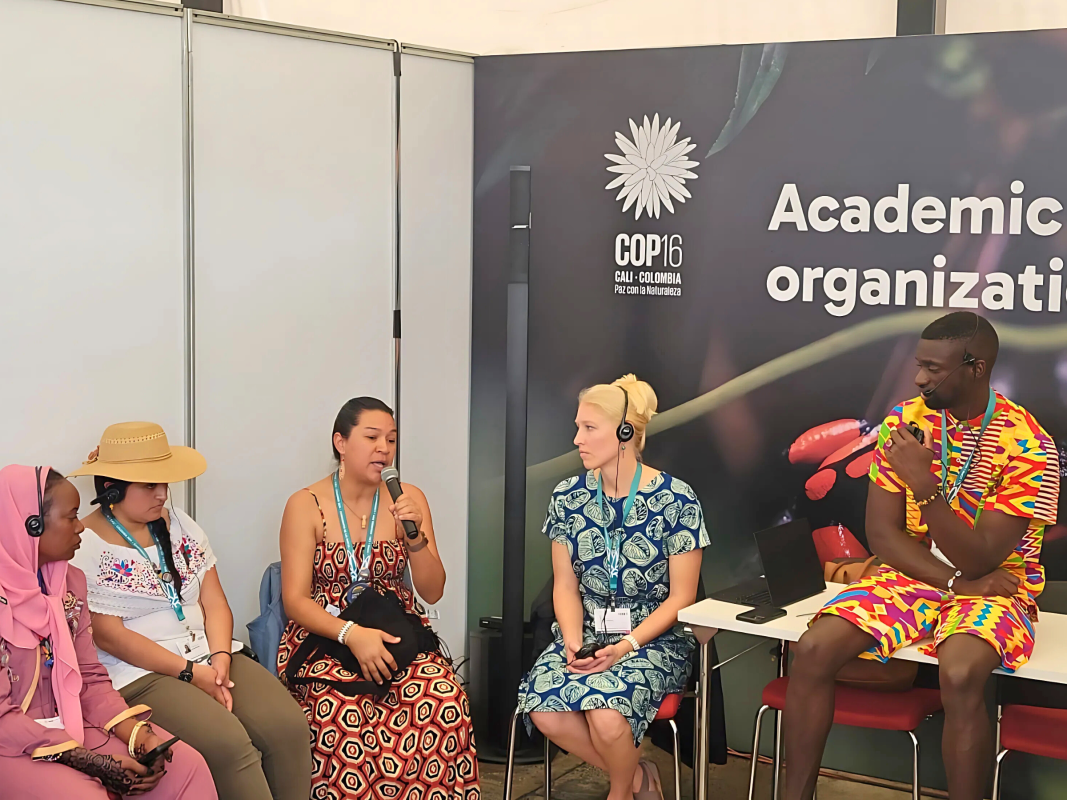
Ordway with members of the Global Alliance of Territorial Communities to discuss their involvement in PANGEA.
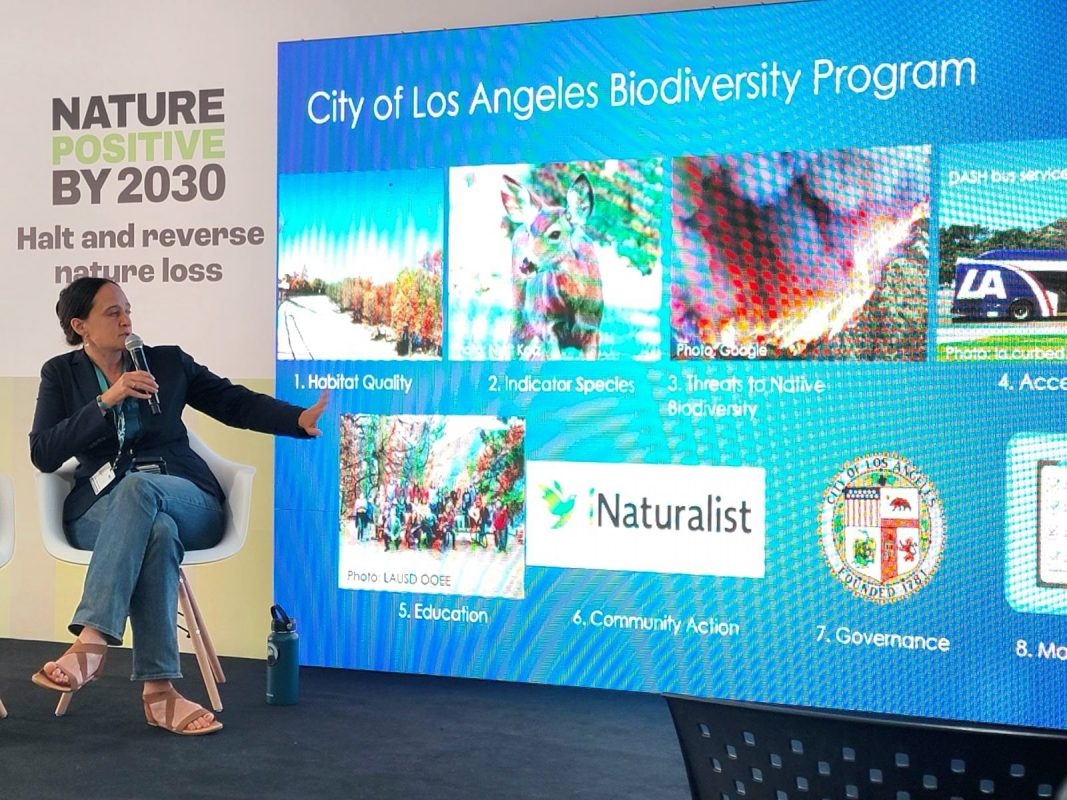

The COP16 experience: Beyond the panels
Attending the United Nations Conference of the Parties is a pivotal experience for any environmental researcher, but for Felipe Zapata, it was a convergence of professional and personal milestones. COP16’s significance, combined with its location in his home country of Colombia, amplified its impact for him.
“It was really exciting in many ways,” Zapata shared. “Having Colombia at the center of this important international conversation… it gave me pride to be a part of this discussion” he said. For Zapata, the host city of Cali was an ideal scene for the summit. Nestled in southwestern Colombia, Cali serves as a biodiversity hotspot, blending the Pacific coast, Andes and Amazon Basin ecosystems.
“The city’s surroundings are beautiful. You can hike in elevation and get to see completely different ecosystems, from the lowlands to the mountains,” Zapata said. Cali’s rich cultural heritage—from lively Afro-Colombian music to rustic Andean cuisine—embodied the summit’s themes of diversity and conservation.
Despite COP16’s demanding schedule, Zapata and his team took a day to immerse themselves in Cali’s natural beauty. Led by colleague Tom Smith, they embarked on a birding excursion in the lush landscapes near the city.
“We went to a place with amazing setups for bird feeders, particularly for hummingbirds,” Zapata shared. They also spent the afternoon hiking, enjoying hot chocolate and arepas—a type of flatbread stuffed with fillings like fried plantains and cheese that dates back over 3,000 years.

The team birded at Finca Alejandria, the Hummingbirds’ Paradise in the cloud forest outside of Cali.
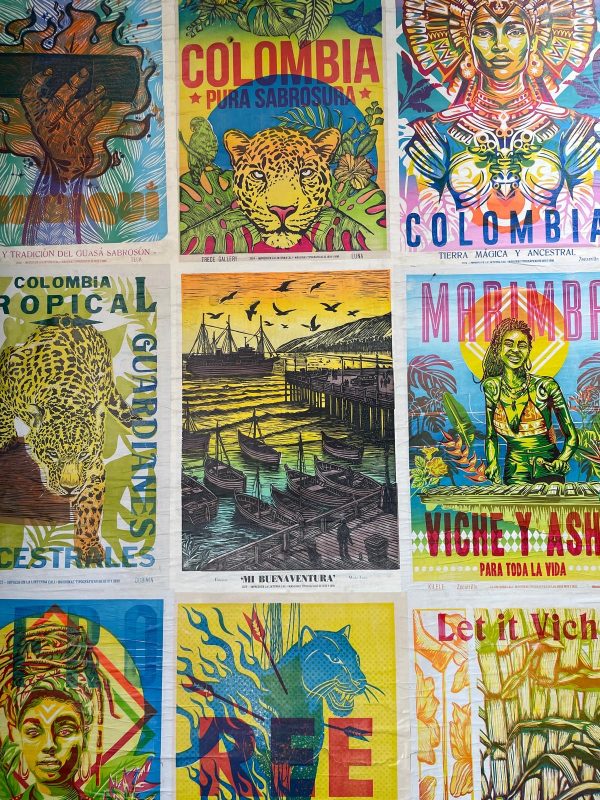

Moving science to action isn’t easy
COP16 underscored the challenges of translating research into actionable policies. While the summit concluded with several unresolved issues, key decisions will carry over to a follow-up meeting in Rome, scheduled for February 2025. This continuation is technically still part of COP16, where delegates and leaders will aim to address unfinished business. Despite these delays, the UCLA team left the conference with a sense of optimism.
“These meetings are challenging, with decisions that cascade from international to local levels. Progress can feel slow, but we’re hopeful for more concrete outcomes in Rome,” Zapata said.
He emphasized that achieving the Global Biodiversity Framework’s targets hinges on implementation. “The challenge has always been execution—translating what we know into what we do,” Zapata said, noting that strengthened funding and capacity-building are essential for sustainable and inclusive conservation efforts.
The path forward
The UCLA researchers returned from their first COP summit energized and focused, having cultivated key partnerships and a clearer roadmap for future initiatives. “The insights gained from COP16 will directly guide our team’s next steps,” Zapata said. “Staying attuned to the latest developments, needs and ideas in global climate policy enables us to engage with the international community in meaningful ways.”
As the global community looks ahead to Rome, UCLA’s Center for Tropical Research and Congo Basin Institute remain steadfast in their mission to turn ambitious biodiversity goals into tangible action. By bridging scientific research with real-world applications, these researchers aim to foster sustainable and inclusive practices that benefit ecosystems and communities worldwide.
